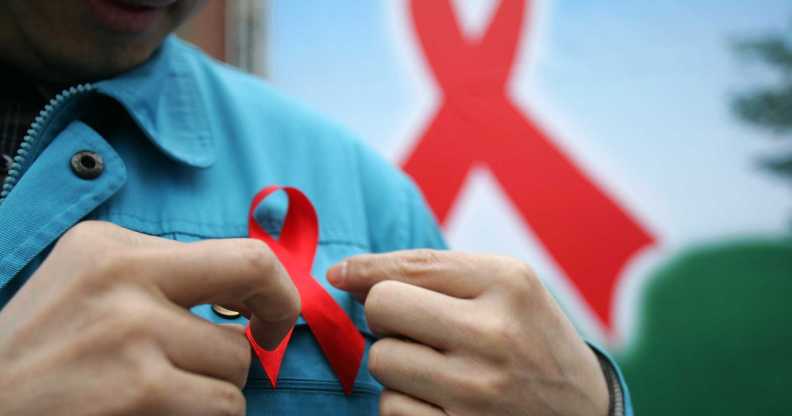Government health boss commends ‘extraordinary uptake’ of HIV opt-out scheme

An expansion of the HIV opt-out testing scheme could save thousands of lives (China Photos/Getty Images)
Opt-out blood tests for HIV, Hepatitis B and Hepatitis C will be rolled out to more sites in the UK, with the potential to save thousands of lives and meet the goal of ending new transmissions by 2030.
Under the opt-out scheme, anyone having a blood test at selected A&E departments will also be tested for HIV, Hepatitis B and Hepatitis C, unless they opt out.
Ahead of World AIDS Day on 1 December, on Thursday (29 November) the government announced the new £20 million project will expand on the hugely successful HIV opt-out testing programme.
It also comes after music legend Sir Elon John told MPs the UK could be “the first country in the world to defeat this awful virus” and implored them “not waste your allotted time as political leaders”.
During the first 18 months of the opt-out testing programme, 33 emergency departments conducted millions of tests and identified more than 4,000 people unknowingly living with bloodborne infections – including hundreds with HIV.
The programme will now be expanded to 46 more emergency departments in 32 high HIV prevalence areas of England.
Speaking with PinkNews about the announcement deputy chief medical officer Dr Thomas Waite described the success of the scheme as one of “extraordinary uptake”.
The aim of the scheme, he explained, is to reach people who do not routinely make contact with HIV or wider STI services as well as groups who are often missed, such as women and older people.
“There are some things I think we do need to learn from this initial pilot,” Waite said, “because whilst overall uptake is good, actually uptake by area varies from about 25 per cent to about 75 per cent.”
“We need to look at how well this is supporting people in a range of different ethnic backgrounds, range of different population groups and make sure that we are reaching those who truly need them,” he explained.
Summarising the importance of regularly getting tested – which the government recommends annually for gay and bisexual men or every three months if having unprotected sex with new partners – he said: “Getting tested is the best way of taking control of your health, because knowing your status allows you to get on to highly effective treatments for HIV as well as for a range of other sexually transmitted infections.”

He continued: “We’ve had good results from the A&E opt-out testing and the pilots, we will now optimise delivery of that in the next phase but it’s only one form of testing.
“There are lots of ways to get yourself tested so that we try to get our way down towards having the lowest possible burden of disease that we can.
“Ultimately, the reason for getting tested and getting on to treatment is that the treatment is very effective.
“You can get your viral loads down for HIV to an undetectable level and that means that HIV is untransmissible, with all that means for your quality of life.”
Commenting on the announcement, Richard Angell – chief executive of Terrence Higgins Trust – said it is the “testing turbo boost” needed to end new HIV cases by 2030.
“It’s hugely significant that an additional 2 million HIV tests will be carried out in A&Es over the next year thanks to a temporary but wholesale expansion of opt-out HIV testing to 46 additional hospitals.
“With this landmark investment, opt-out HIV testing in A&Es will account for more than half of all tests in England. This major ramping up of testing is absolutely crucial to find the 4,400 people still living with undiagnosed HIV.”
Angell added: “The evidence is crystal clear: testing everyone having a blood test in emergency departments for HIV works.
“It helps diagnose people who wouldn’t have been reached via any other testing route and who have often been missed before.
“It also saves the NHS millions, relieves pressure on the health service and helps to address inequalities with those diagnosed in A&E more likely to be of black ethnicity, women and older people.”

